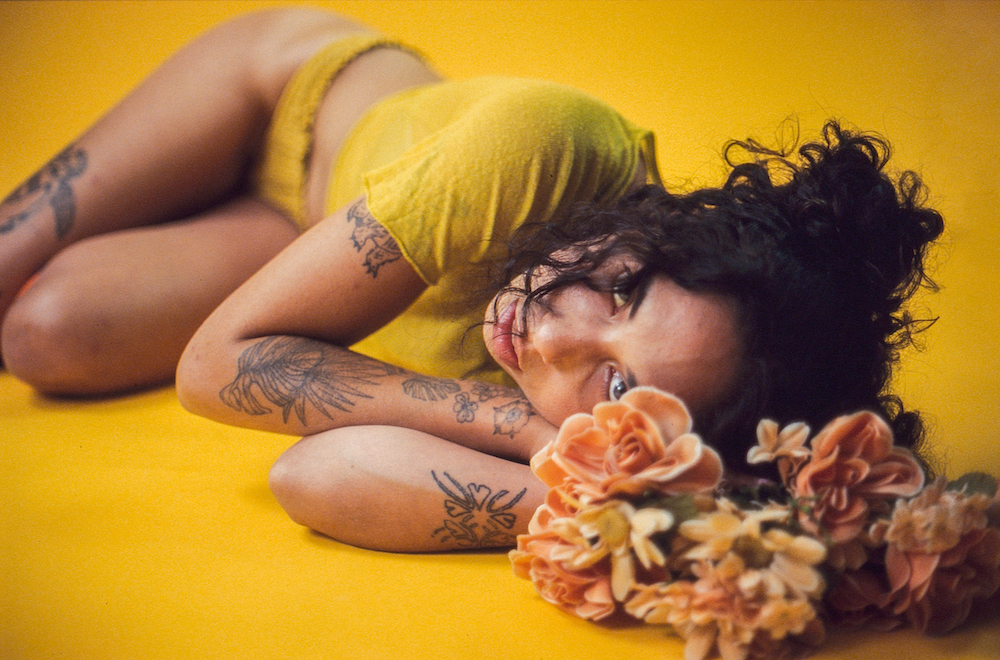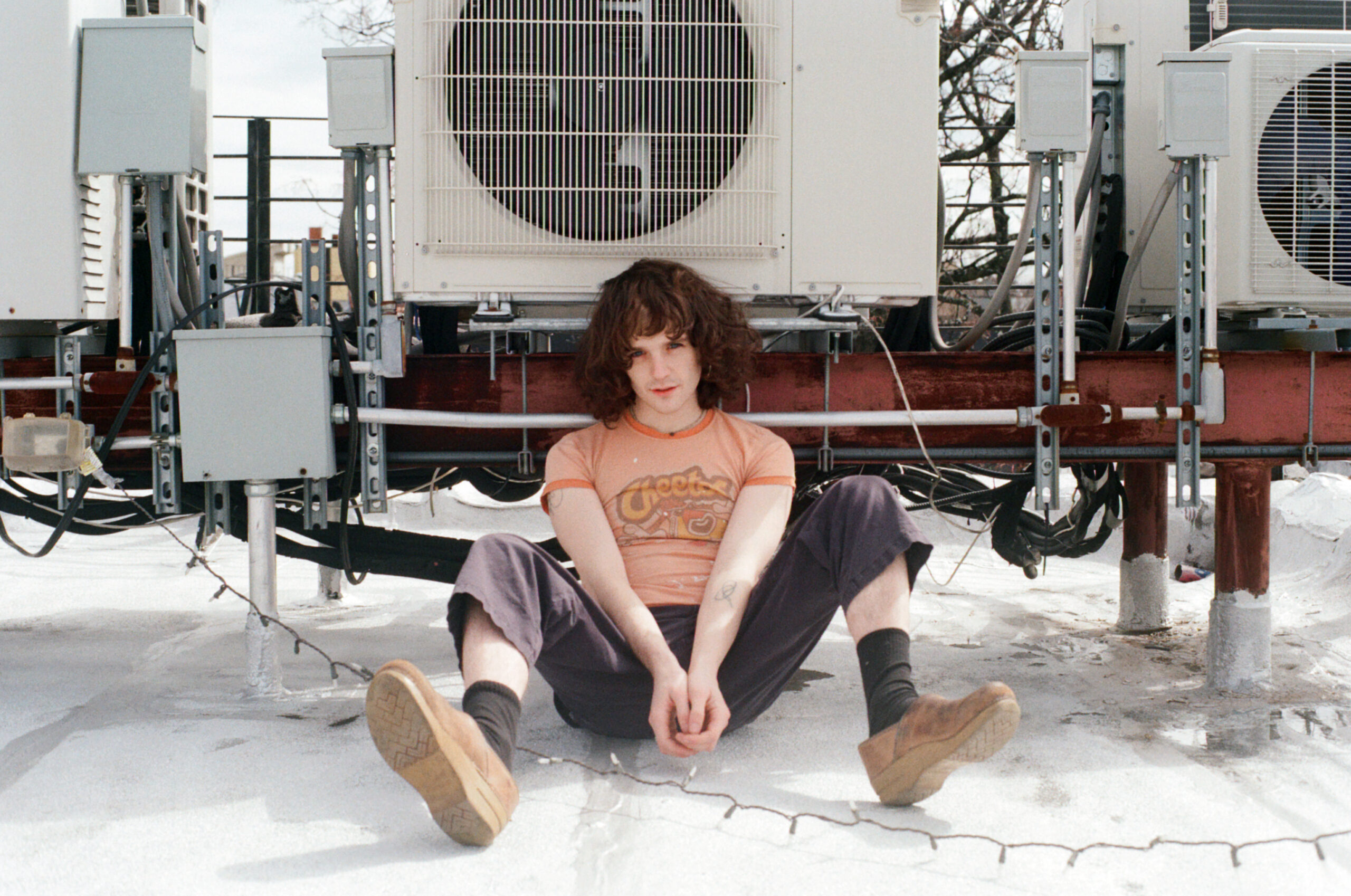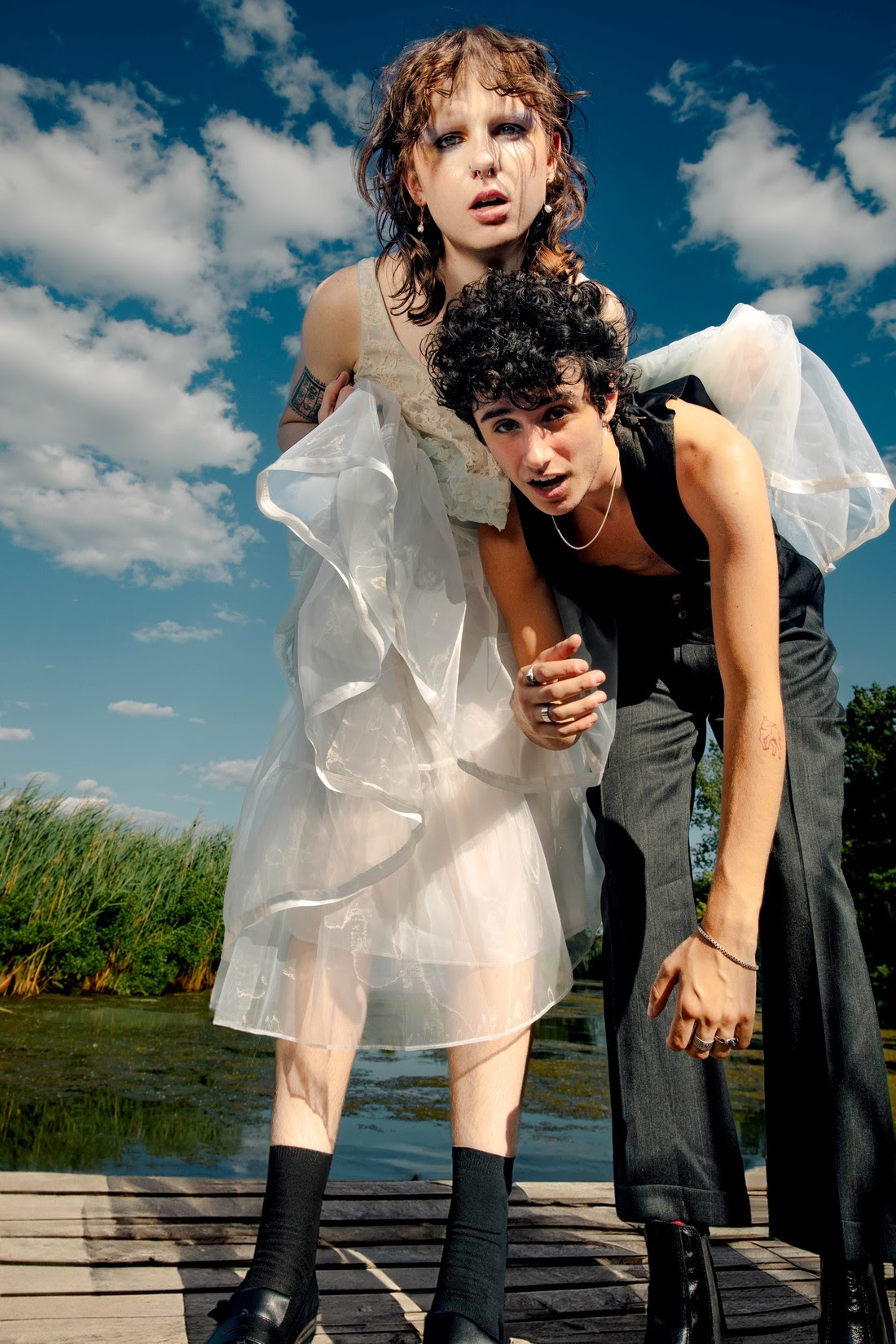"I'm sure everyone's had this conversation," Indigo De Souza says before recounting a conversation that certainly not everyone has had: "About when you love someone so much that you're not sure if you want to be the one to die before they die so that you don't have to experience their death, or if you want to die after they do so they don't have to experience yours."
De Souza is talking about one of her new songs, "Die/Cry," on which she sings: "I'd rather die before you die/ Before you die, before you die.” She repeats that phrase enough times that it eventually becomes a lighthearted, celebratory mantra of love. The Asheville, North Carolina-based songwriter is often casually existential like this, especially on her forthcoming record, Any Shape You Take. Its lead single, "Kill Me," possesses the same kind of tension -- intense lyricism sung with a vibrant casualness. Throughout the album's 10 tracks, De Souza is candid in a way that's freeing and admirable.
Any Shape You Take follows De Souza's stunning 2018 debut I Love My Mom. Her new songs have the same intimacy and emotional resonance but on a larger scale. She recorded it with Brad Cook, producer for Bon Iver and Waxahatchee, at Sylvan Esso's studio in Chapel Hill. The instruments are louder and more daring; her voice is confident and unrelenting. At one point on the album, the music is taken over by a collage of screams from audio that her fans sent in. "It came from this idea of collective pain," she says. "I just wanted to do something that would involve people." It serves as the transition halfway through a song called "Real Pain," which starts as a stressed-out, gloomy indie-rock moment and then bursts into a buoyant, poppy melody.
Read our chat with De Souza about the making of the new record, the ways she embraced change, and her reaction to having lots of people care about her songs.
How has your quarantine been?
INDIGO DE SOUZA: It has been really good. It’s probably been the most stable time in my whole life. I’d never really had the chance to slow down enough to really build community around me and to really feel like I belong somewhere. From that terrible thing was born the opportunity to do that. It ended up being an incredible thing for my mental health. I feel much more stable and much more held, much more loved than ever.
I've heard a lot of people say that. How did that opportunity come about to build a community around yourself?
DE SOUZA: I had a very, a very low point at the beginning of the pandemic. There was a lot of shifting in my personal relationships, and I felt very alone. Then through being alone, more alone than I had been in a long time, I felt very close to myself. I found a lot of love for myself. Through finding a lot of love for myself, I guess I somehow manifested the kind of love that I deserved from people because I was treating myself in a good way. I realized my own boundaries and the ways that I wanted to be loved by other people and then manifested those things. So the people that I ended up meeting from that space were just much closer to the land than the people that I had known before and are just very open and able to see me in a lot of different shapes that I take and celebrate those shapes.
It was an extreme low, and then I found love for myself. And then the world opened up for me because I did the work to get there. I realized what I really wanted from relationships, and then have been cultivating a really beautiful community of people that are all holding each other in a really special way. And celebrating nature in a really special way and just spending time together and in the woods, in the world, in a more hands-on way than I ever have been a part of.
Did you go into making this record with any ideas of how you'd want to make it different from the last one?
DE SOUZA: No, not really. Although I definitely was hoping for something more hi-fi. I'm always trying to move towards incorporating elements of pop into a kind of more grunge rock sound because I really like the feeling of crunchy, nasty, dirty stuff aligned with really hi-fi, clean, more pop elements. I feel like I got to do that on this album, which was really fun. I just had different resources than I had before. For I Love My Mom, it was a very DIY bedroom/living room set up and I hadn't recorded music, and I didn't even really consider recording an album ever. I'd recorded some things, but I still didn't really know a lot about it. And this time, it felt like I had more resources and more knowledge and a more clear idea of what I wanted to do.
When you say that you never thought you would end up recording an album, what inspired you to end up doing that?
DE SOUZA:My whole life I had been playing on my own, singer-songwriter stuff in cafes and on the street, anywhere I could. I had just started playing with other people in a band setting. I think whenever that happened, that's when I realized that my songs were kind of more fully-realized ideas and they could actually take the form of an album someday. Even once I understood that, I still felt like it would be a long time from then. And then I just happened to create friendships with people who were recording stuff and they knew way more about that than I did. I think that I was mostly just inspired by their encouragement towards me, because they were like, ‘Oh, you started a band and you guys are playing these songs, you should just record them since you have all the parts for them,’ and that just made sense. It all just happened kind of organically. I just chose a handful of the songs and we did it. Then I started to feel excited about more albums in the future after that, because I was able to see it as a reality.
You’ve said you didn't expect the songs to get as much attention as they did. What was your reaction to that?
DE SOUZA: It's wild. I remember the moment when I realized that people were listening to them. We were playing a little house show in Raleigh. It was a multi-storied house and it was just a wild party. We played in this very small room, and so many people played, but I think we played last and so many people piled into the room, and it was all sweaty and crazy. We started playing and the entire set that we played the whole room was singing all the lyrics with us. I remember crying that night, because I realized that something really special was happening. It's still hard for me to understand. It just feels really special and it makes me feel less alone. Because those songs are just like my brain. So it's cool that people can relate to that, or can find something that they can relate to.
For this new record, a lot of the press release is about how it deals with embracing change. I was wondering what some of the changes are that you deal with most on the record?
DE SOUZA: I think the biggest change is that on this record I embrace a lot more positivity than I have before. Because I have found a lot of positivity and light as of late in my life, and I’ve realized that my default personality is a bright, moving thing that dances a lot and bops around a lot. I am a very, deeply sad person, but I kind of cope with that sadness by creating as much light as possible for myself and for people that I'm around so that we can find joy and laugh together and feel things presently.
I feel like this album is special because I think that I got to encompass a lot more of that positivity, but also still honor and face a lot of the darkness that I feel. I think the album is cool, because it kind of dips back and forth between those things, which is how I feel that I change throughout the day and throughout my life as a person.
I wanted to bring up the song “Pretty Pictures,” because it's a song that's really catchy, but the lyrics are so intense and sad. That song to me just symbolizes how the whole record balances being youthful and being wise really well. I think the idea of the song is very mature — of having to break up with someone even though you love them and how love isn't enough. Can you tell me about writing that song?
DE SOUZA: Yeah, I think that song really feels relevant to the theme of the album. I remember when I was writing it, I was going through a breakup. And it was a very simple breakup; there was nothing wrong within the relationship. It just didn't feel like the right time for me to be with that person, and it just felt like not the right thing for my body. At the time, I was realizing how sweet it is to love someone through all the shapes that your relationship might look like with them, and that even if you're not dating or committed to each other, you can still love each other and respect each other's lives. You can still choose people to shift through life with whether you're committed to each other or not.
I also remember writing and thinking about how I don't hear a lot of positive breakup songs. They’re usually very spiteful towards the other person or just really deeply sad about the loss. But when I was writing this song, I felt a loss, but a really beautiful acceptance of that loss, and then learning from it and moving through it in a way that felt true to both parties and respectful of the connection that we shared.
A lot of the love on this record is entangled with this intense existential feeling. Where does that come from in your life?
DE SOUZA: I don't know. I'm alive. I'm just a person who's alive, so it seems like it would be a given. But I've actually noticed that most people in the world I can't relate to at all. I noticed that they're actually not very present with their bodies and the mortality of their themselves. Music and jokes are my way of decompressing my existential doom, because it's not present in everyone's minds all the time. I have to find outlets for those things to be able to live a lighthearted life. I'm just a heavy weighted person, but I make a lot of light out of it.
And my existential feelings create a space for me to be able to see everyone in a really forgiving and accepting way. Even when people do something weird or bad or hurtful, or are alienated because of some way that they are, I am able to see the core of people in a cool way that allows me to move through the world with a lot of compassion. So spiritually, that feels like a really good place to come from because I'm able to relate to people as humans, even though I don't actually relate to the way that they think or the things that they're doing or the way that they operate in the world. I almost never relate to those things, but I am able to see people as their souls and I'm able to understand where people are coming from.
Do you think that your compassion plays a large role in your music?
DE SOUZA: Compassion is definitely a huge part of it. Compassion for myself is the biggest thing that I feel when I'm creating the music because when I'm actually sitting down to write a song it takes a lot of sacrifice. I have to fully engage with whatever thing I'm feeling and want to write about. In order to fully engage, I know I'm going to feel a fair amount of pain. So actually making the choice to go sit down and look at that feeling and face it fully is the most connected I can be to myself and the most present I can be with myself and the most compassionate I can be.
I've found that sometimes I'll even actually try to avoid it. I’ll realize that I have a song that I want to write or something that will start coming through to me subconsciously, and then I will think to myself, 'Okay, you can go sit down and work on this song right now and face the feeling, or you can go hang out with your friends or go do something else or get distracted again.' Sometimes I choose that route, because I don't have the energy to fully embrace whatever thing I'm feeling. So yeah, the songs that really do come through, and especially the ones I've chosen to put on this album and future albums and past albums are all coming from a very intense space of compassion.
Any Shape You Take is out 8/27 via Saddle Creek.







